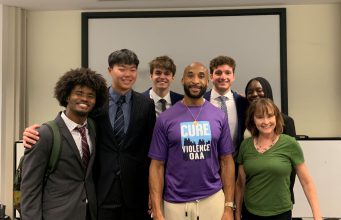This spring, Nikki Graves’ Business Communication 365 class tackled a special midterm project. Students worked with independent film-making company Anchored Lens Productions to create a communication strategy aimed at increasing investment in independent film production. For Graves—and for her Business Communication class—the project was a full circle moment. Anchored Lens’s COO is Patrycja Kepa 21BBA—Graves’ former student. Kepa took Business Communication back in 2017, and, after taking the course, she became Graves’ lead teaching assistant.
Anchored Lens also has the criteria Graves looks for in the organizations she chooses as clients for her Business Communication class’s midterm project. For each semester over the past several years, Graves has applied for and received $1500 grants from Emory University’s Center for Faculty Development and Excellence (CFDE) to work with small businesses and/or non-profits to support community-engaged projects.
“Students engage in and enjoy community-based experiential learning more than textbook cases,” explains Graves. “The community clients ask students to offer recommendations to solve live problems. The clients receive the grant money, and our students gain valuable experience. The work is especially exciting for students because they know that the clients will implement many of their recommendations.”
Empowering Change Through Film
Anchored Lens is not only dedicated to producing high-quality content, it also leverages the exposure that the film industry provides to help end homelessness. Anchored Lens goes beyond storytelling to provide resources, support, and job training through an apprenticeship for students experiencing homelessness on its film sets and productions. The company also pledges to donate 10 percent of its profits from its feature films to its Homeless Foundation and to increase outreach to under-resourced communities.

Anchored Lens’s focus on homeless and under-resourced students is not arbitrary. As a child (and again as a struggling actor), the company’s CEO and founder, Acoryé White, experienced homelessness. Kepa, who has Polish and Greek roots, was able to go to college due to “Emory’s gracious financial aid,” she says. (Emory is one of the few private universities in the United States that recognizes DACA and undocumented students as domestic applicants and grants them need-based financial aid to assist with paying for college.) As a senior, Kepa won Goizueta’s transcendence award, given to a graduating student in its undergraduate BBA program for serving as a role model in breaking down barriers and demonstrating resilience.
“As someone who grew up first generation, low income, and undocumented, that social piece is super important to me.” says Kepa.
How do we leverage a film industry that supposedly has so much reach and so much wealth to create positive change? How do we reach everyday people who want to be part of a movie—either as a donor, investor, or partner? We’re trying to hone in on an actual process that can feasibly be replicated in terms of raising funds for additional films.
Patrycja Kepa 21BBA
“If we can see that what happens with the partner changes what happens in the classroom, and what happens in the classroom also enhances the work of the partner, we have the ingredients for perspective transformation for both,” explains Vialla Hartfield-Méndez, director of engaged learning at the Center for Faculty Development and Excellence. “The Anchored Lens project has all these key hallmarks, and we in the Engaged Learning Program at the Center were pleased to see that good fit with the goals of the grant and to be able to fund it.”
Big Strategies for the Big Screen
All in all, fourteen teams presented a variety of communication strategies for Anchored Lens. The “Big Screen, Blockbuster Impact” team’s target audience was “socially conscious people who are focused on making ethical investments and creating a better impact,” explains Cellina Park 25BBA, one member of the team. “That’s why we decided to focus on the academic environment.” By partnering with academic institutions in the Atlanta area, Anchored Lens could provide film screenings, lead discussion sessions, and host student film competitions, workshops, and guest lectures. The team also suggested collaborating with nonprofit organizations, specifically those that fight homelessness. Specifically, they suggested that Anchorered Lens work with Atlanta Mission. The organization is Atlanta’s largest and longest-running provider of services to homeless men, women, and children.
Our homeless apprenticeship program deals with unhoused students and bringing them on set, but we’ve never considered engaging with volunteers who work with those experiencing homelessness or who already support social impact causes.
Patrycja Kepa 21BBA
“That stood out to us,” explains Kepa.
Other strategies that resonated with Kepa and her cohorts on how to spend the $1500 included:
+ Host VR pop ups at film festivals that would showcase Anchored Lens’s films.
+ Create short reels for use on various social media platforms.
+ Use the YouTube channel Omeleto to stream short films that feature unhoused youth.
+ Host table talks at film festivals.
+ Launch a merchandising initiative that includes QR codes that link to Anchored Lens’s website.
+ Utilize various third-party investment sites such as Kickstarter.
+ Revamp the production company’s website.
Anchored Lens has already engaged several of Graves’ students to help with its website. Another student plans to audition for the company’s next feature film, “The Grove,” which is currently in pre-production. And Anchored Lens has engaged Park to focus on the upcoming film’s social media campaign. “This class really helped me more than I expected,” notes Park. “I was able to get real world experience—not only getting an offer—but I was able to work in a very professional setting. I think I’m going to take away a lot more from working on ‘The Grove.’”
Experience, Resilience, and Tenacity
Kepa, who worked as a consultant for McKinsey after graduating, believes Goizueta and the Business Communication course helped prepare her for her current role. “It’s so important to value your team. To know when to delegate and when to step away. To know when to speak up,” she says. “At times, no one on my team would be doing their work. How do you maneuver through those circumstances that are both real in school and real in life? Learning how to navigate teamwork was a huge take away from Business Communication and Goizueta. My education also offered an opportunity to develop my tenacity. I’ve found that tenacity is essential for creating an independent film company.”

Kepa’s resilience was front and center when she and White kept getting low ball and unfair contract offers from distributors for Anchored Lens’s first feature film, “Trinket Box.” So, they decided to distribute it themselves. They cold-called individual theaters across the United States to see if they’d show the film. Then, they called big chains like AMC, Regal, and Cinemark. “We contacted anybody and everybody we could find,” says Kepa. “As a result, we were able to secure over 45 individual theaters to premiere our film directly through our company.”
For “The Grove,” Kepa has commitments from Regal and several other companies. Anchored Lens has so many commitments that the opening of “The Grove” will be considered a wide release. “Wide releases are something only big studios do,” states Kepa. “If we can make money with “The Grove,” we will create a self-sustaining cycle of profits. We can feed that into our other films,” she adds. “Potentially, we can bring on other independent filmmakers under Anchored Lens to spread and widen that pie.”
In addition to its apprenticeship program and profit pledge, Anchored Lens helps actors and creatives break into the film industry. The company provides acting classes, seminars, and services that help them build their resumes and secure roles. The company also plans to rent equipment and gear to local production companies. The Anchored Lens team is working in multiple ways to achieve their mission.
Graves is endlessly grateful for the grants that the Center for Faculty Development and Excellence’s Engaged Learning Program provides. This semester’s grant was especially important since it allowed her to work with a former student who is now a close friend. “I admire Patrycja for her courage and bravery in working through the obstacles she faced as a DACA student and faces as a woman in the film industry,” Graves says. “Also, I love Anchored Lens’s mission and vision. I also love Patrycja’s and Acoryé’s determination to disrupt the film industry—in the very best of ways. So, I am honored to a part of their journey.”











